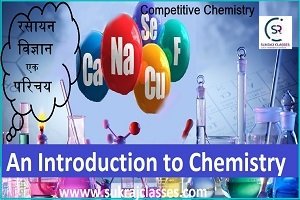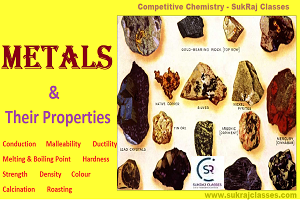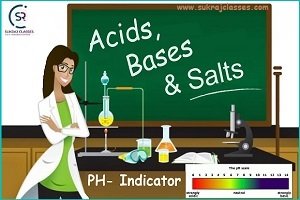
Introduction to Chemistry for Competitive Exams
Chemistry topic – “Introduction to Chemistry”, is important for all competitive exams like CET- Common eligibility Test, SSC CGL, SSC CHSL, RRB NTPC, UPSC and other state civil services exams. In these exams, almost 4-5 questions are coming from Chemistry. Let’s Start topic – Introduction to Chemistry.
Introduction to Chemistry
रसायनशास्त्र – परिचय
Chemistry is the branch of science that deals with the composition, structure and properties of matter and also how and why matter undergoes certain changes (the changes that it undergoes as a result of chemical reactions).
- Constituents of matter are atoms and molecules.
- Chemistry plays a central role in science and is often intertwined with other branches of science like physics, biology, geology etc.
- Chemistry has been divided into branches like organic chemistry, Physical chemistry, Biochemistry, inorganic chemistry, The analytical chemistry, Thermochemistry, Nuclear chemistry, Electrical chemistry (Electrochemistry) and Environmental chemistry.
- Anything we can touch, taste, smell or see contains one or more chemicals.
Matter:– Anything which has mass and occupies space is called “matter”.
-
- Everything around us for example- book, pen, pencil, water, air, all living things etc. are composed of matter.
-
- Matter can exist in three physical states: – solid, liquid and gas.
Father of modern Chemistry:- 
“Antoine-Laurent de Lavoisier” is consider as the Father of Chemistry.
Important works of “Antoine-Laurent de Lavoisier” in the field of Chemistry are:-
- Antoine-Laurent de Lavoisier work on the principle of “conservation of mass”.
- He worked for development of a new system of “chemical nomenclature”.
- Antoine-Laurent de Lavoisier wrote the first chemistry textbook, “Elementary Treatise of Chemistry,” in 1787.
- He named the gases of oxygen and hydrogen.
- He discovered about “air is a mixture of gases”.
- He helped develop the metric system.
- He put forward the influential oxygen theory of combustion.
- Antoine-Laurent de Lavoisier established that water was a compound and not an element.
- Antoine-Laurent de Lavoisier also discovered that sulphur is an element and diamond is a form of carbon.
First Nobel Prize in Chemistry:-
The Nobel Prize in Chemistry is awarded annually by the “Royal Swedish Academy of Sciences” to scientists in the various fields of chemistry. 
The first Nobel Prize in Chemistry was awarded in 1901 to “Jacobus Henricus Van’t Hoff”, of the Netherlands, for his discovery of “the laws of chemical dynamics and osmotic pressure in solutions”.
Principles of Chemistry: –
- Functioning of brain and operation of a computer.
- Chemistry plays an important role in chemical industries for manufacturing fertilizers such as urea, calcium superphosphate, sodium nitrate, and Ammonium Sulphate. These chemicals have helped greatly in increasing the yield of fruits, vegetables, and other crops.
- Chemistry also plays an important role in meeting human needs for health care products (medicines that cure disease).
- Chemistry is improving the quality of life. Chemistry in our everyday life provide us acids, salts, dyes, polymers, drugs, soaps, detergents, metals, alloys and other inorganic and organic chemicals
- Chemistry plays an important and useful role towards the development and growth of a number of industries for manufacturing glass, cement, paper, textile, leather, dye, paints, pigments, petroleum, sugar, plastics, Pharmaceuticals etc.).
For More:
If you like and think that General Science (Chemistry) topic on “Introduction to Chemistry” was helpful for you, Please comment us. Your comments/suggestions would be greatly appreciated. Thank you to be here. Regards – Team SukRaj Classes.





